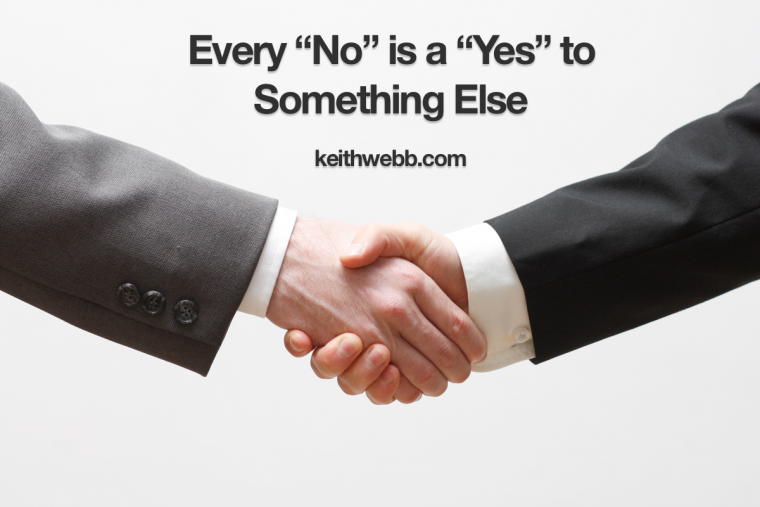I’ve observed that what sets excellent leaders apart is not what they know, or who they know, but how much they “no.” Saying “no” is a prioritizing and focusing behavior that means saying “yes” to something else – and greater results.

The word “no” is formed with only two letters, but for many of us it’s one of the hardest words to say.
When it comes to work-related things, I don’t like saying no. Here are some of the reasons, and what is really happening:
- I like to help. Sam Metcalf often reminds non-profit workers, “Need does not constitute calling.”
- I don’t want to disappoint. This is more about my emotional comfort than their disappointment.
- I think I’ll have time later to do it. I won’t. If I don’t have time now, I won’t later. I wrote about this here.
- It won’t take me very long. We underestimate how long tasks will take by 50%.
A better way to think about saying “no” is that every “no” is actually a “yes” to something else.
Every “No” Is A “Yes” To Something Else
- Say “no” to say “yes” to the important. What is truly important to you, to your work’s success? For me, writing an engaging, weekly blog post is important. I said “yes” to writing this article by saying “no” to emails, calls, my laziness, and an offer to go to lunch with friends. Determine the activities that are important to your success and say “yes” to them by saying “no” to others.
- Say “no” to say “yes” to less. More is not better, less is better. You already work hard. Further progress is not a matter of more time, more energy, and getting more done. It’s now about using your time for the important. Spending energy on only the crucial. And getting done the things that are essential to success. Saying “no” is really saying “yes” – yes to less, yes to better.
- Say “no” to say “yes” to your family. A challenge for all of us is how to not let demands on your time interfere with time with your family. I know a pastor whose kids said, “My dad bent over backwards for everybody else, and we got the leftovers.” I’ve given leftovers to my family at times. Too much travel. No time (or proper planning) for a vacation. Saying “no” may be saying “yes” to your family.
- Say “no” to say “yes” to yourself. My mother is a saint. Everything she did when I was growing up was for one of her four kids, my dad, or a friend in need. Now in this season of her life, she says an occasional “no” to us in order to say “yes” to herself – and I love her for it! We all need to say “yes” to ourselves in order to recharge and develop ourselves.
- Say “no” to say “yes” to the valuable. I have a number of products and events that I market. Two are responsible for the majority of impact and income we achieve. The others support these two things or are auxiliary to them. In order to say “yes” to the impact-making events, I have to say “no” to the urgent cries of the auxiliary events. I’ve also dropped events altogether to say “yes” to the valuable.
If you love to say “yes,” then think about what you want to say “yes” to. For every “yes” you must say “no.” Be ready with “no” in order to say “yes”!
Question: What helps you to say “no”? You can leave a comment by clicking here.


Please note: I reserve the right to delete comments that are offensive or off-topic. You own your comments but give me permission to use them. See My Comments Policy. Read my Permissions Policy to know how you can use my posts.